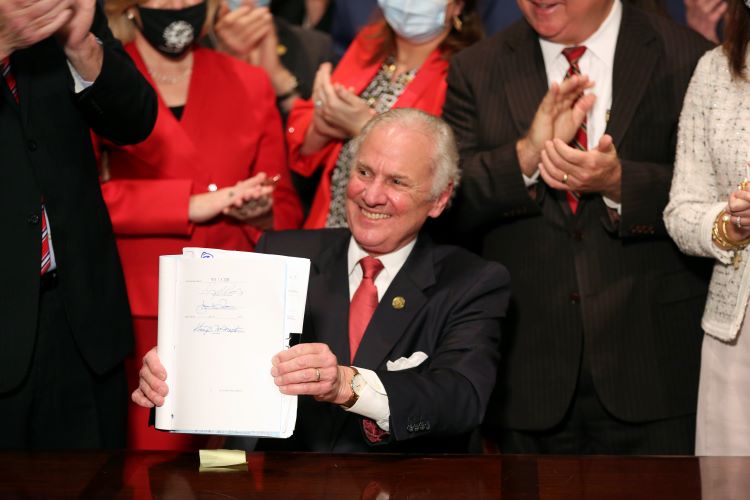Six-week abortion ban violates right to privacy, South Carolina Supreme Court rules
 Republican South Carolina Gov. Henry McMaster holds up a bill banning almost all abortions in the state after he signed it into law Feb. 18, 2021, in Columbia, South Carolina. The South Carolina ban on abortions after “cardiac activity” is no more after the latest legal challenge to the state’s 2021 law proved to be successful. Photo by Jeffrey Collins/The Associated Press.
Republican South Carolina Gov. Henry McMaster holds up a bill banning almost all abortions in the state after he signed it into law Feb. 18, 2021, in Columbia, South Carolina. The South Carolina ban on abortions after “cardiac activity” is no more after the latest legal challenge to the state’s 2021 law proved to be successful. Photo by Jeffrey Collins/The Associated Press.
The South Carolina Supreme Court on Thursday struck down the state’s ban on abortions after about six weeks of pregnancy.
In a 3-2 decision, the state supreme court said the ban violates a right to privacy protected by the state constitution. Justice Kaye G. Hearn wrote the lead opinion.
Hearn said the privacy right is not absolute and must be balanced against the state’s interest in protecting unborn life. But the six-week ban severely limits the right to abortion and is an unreasonable restriction on a woman’s right to privacy, Hearn said.
The South Carolina law required physicians to scan for “cardiac activity” and ask a patient whether they would like to listen. Abortion was generally banned if such activity is detected.
Abortions were still permitted in cases of rape or incest, if less than 20 weeks gestation. There were also exceptions in cases of a fetal anomaly and to protect the health of the patient.
The South Carolina Constitution has a specific reference to a right to privacy. It states: “The right of the people to be secure in their persons, houses, papers and effects against unreasonable searches and seizures and unreasonable invasions of privacy shall not be violated.”
South Carolina had argued that the privacy provision applies only to searches and seizures in the Fourth Amendment context. Such a narrow construction would make the words “and unreasonable invasions of privacy” superfluous because the preceding clause “speaks specifically to searches and seizures,” Hearn wrote.
Hearn also noted that the state constitutional provision was adopted only six years after the U.S. Supreme Court recognized a right to marital privacy in Griswold v. Connecticut that was violated by a ban on contraception.
“There can be no doubt that the authors of this provision were aware of Griswold and its use of the right to privacy,” Hearn wrote.
The state supreme court said the six-week abortion ban takes away a choice for many women who may not even realize that they are pregnant at that time and, when they do, need time to consider their options.
“This confirms that in reality, there is no ‘choice’ at all,” Hearn wrote.
Chief Justice Donald W. Beatty concurred in Hearn’s opinion and wrote separately. He concluded that, in addition to violating the right to privacy, the law also violated rights to equal protection and due process.
Justice John Cannon Few concurred in the result. He said the law was unconstitutional because state lawmakers failed to make factual findings on the key question of whether, under a six-week abortion ban, “a substantial percentage of women cannot know they are pregnant in time to engage in sufficient deliberation and prayer, have meaningful discussions, and then make timely arrangements to have an abortion.”
South Carolina is one of only 10 states that include a right to privacy in their constitutions, Hearn’s opinion said. Several of those states have not addressed whether abortion implicates the privacy right. Among states that have considered the question—Alaska, Florida, Minnesota, Montana and Tennessee—“have answered in the affirmative,” Hearn wrote.
All the decisions were issued before the Supreme Court overturned the right to abortion in Dobbs v. Jackson Women’s Health Organization, a challenge to Mississippi’s ban on most abortions after 15 weeks of pregnancy, however. And Tennessee voters amended the state constitution to exclude abortion rights after the state supreme court decision.
“While Dobbs did not invalidate these decisions because each invoked their respective state constitutions rather than the federal constitution, we recognize that some may be called into question in future litigation,” Hearn wrote.
Hat tip to Reuters, which had coverage of the decision.
Write a letter to the editor, share a story tip or update, or report an error.



